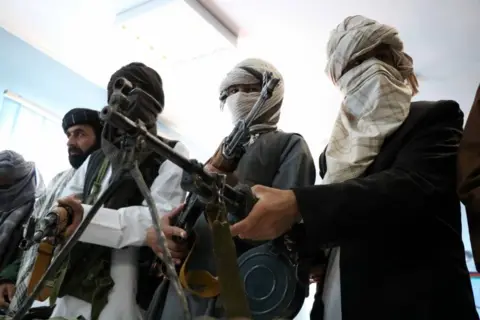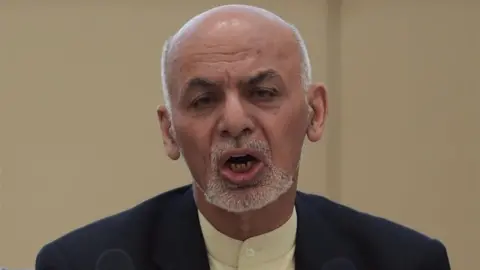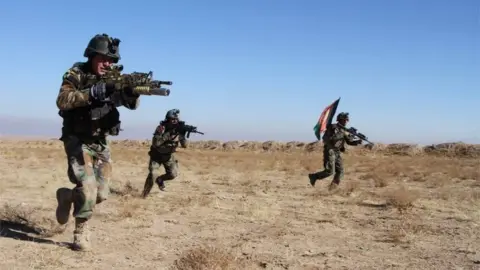Taliban offer: Afghan President Ashraf Ghani seeks talks
 EPA
EPAAfghan President Ashraf Ghani has offered peace talks "without preconditions" to the Taliban after 16 years of war.
Speaking at a peace conference in Kabul, he proposed measures including a ceasefire and prisoner swaps.
In return the Taliban would need to recognise the Afghan government and respect the rule of law.
Previous peace talks offers have not stopped attacks by the Taliban, who have yet to respond to the offer.
A Taliban spokesman told the BBC Afghan service they were waiting for reaction from their leadership.
On Monday the militants said they were prepared to enter direct talks with the US to find a "peaceful solution" to the conflict, but made no mention of negotiating with the government in Kabul.
In the past the Taliban have refused to talk to the Afghan government, a longstanding demand of the US.
 AFP
AFPMr Ghani held out the possibility that the Taliban could be removed from international blacklists and eventually recognised as a legitimate political group with their own office, in Kabul or another agreed location.
"The Taliban are expected to give input to the peacemaking process, the goal of which is to draw the Taliban, as an organisation, to peace talks," he told delegates from 25 countries and organisations involved in the so-called "Kabul Process".
"A ceasefire should be held, the Taliban should be recognised as a political party and trust-building process should be initiated. Now the decision is in your hands, accept peace... and let's bring stability to this country."

Who's going to compromise?
By Dawood Azami, BBC World Service
There's a sense we've been here before. Mr Ghani and his American backers have issued similar calls to the Taliban in the past.
The president didn't mention foreign forces or when they might leave Afghanistan - the main public demand of the Taliban before any peace talks can take place with the Afghan government.
Why the militants would shift their stance or agree to a ceasefire is unclear. Although the Taliban are under pressure and have suffered heavy casualties, they are more powerful now and hold more territory than at any time since they were driven from power in 2001.
Mr Ghani's government, on the other hand, is facing internal challenges and is divided on certain issues.
In calling again for talks he's trying to put pressure on the militants - but it's an acknowledgement that, despite President Trump's more aggressive US military policy, no one side can win the conflict militarily.
Timing is also important. Fighting is intensifying and the conflict is getting more complicated, with the emergence of groups like so-called Islamic State.
But in the end, who's going to compromise? All the major parties say they want peace through dialogue - but they want it on their own terms.

Tens of thousands of people - combatants and civilians - have been killed in Afghanistan since US-led troops drove the Taliban from power in 2001.
Under previous initiatives, some former Taliban members have surrendered, but the group has only grown stronger.
The US military stepped up assistance to Afghanistan last year and since then air strikes have increased.
 EPA
EPAForeign combat forces withdrew in 2014. Since then the Taliban have extended their influence over swathes of the country and areas taken from them are now back under their control.
The Afghan army has suffered mounting casualties, although the Taliban are also reported to have been hard hit by US air strikes.
A BBC investigation published in January found the militants now have an active presence in 70% of Afghanistan.
